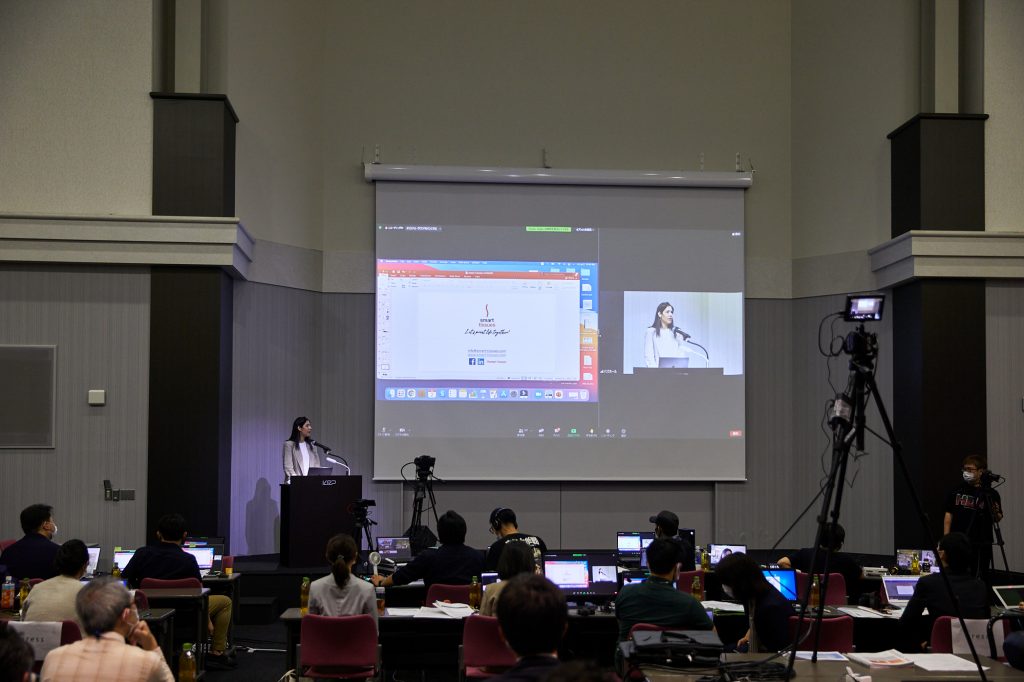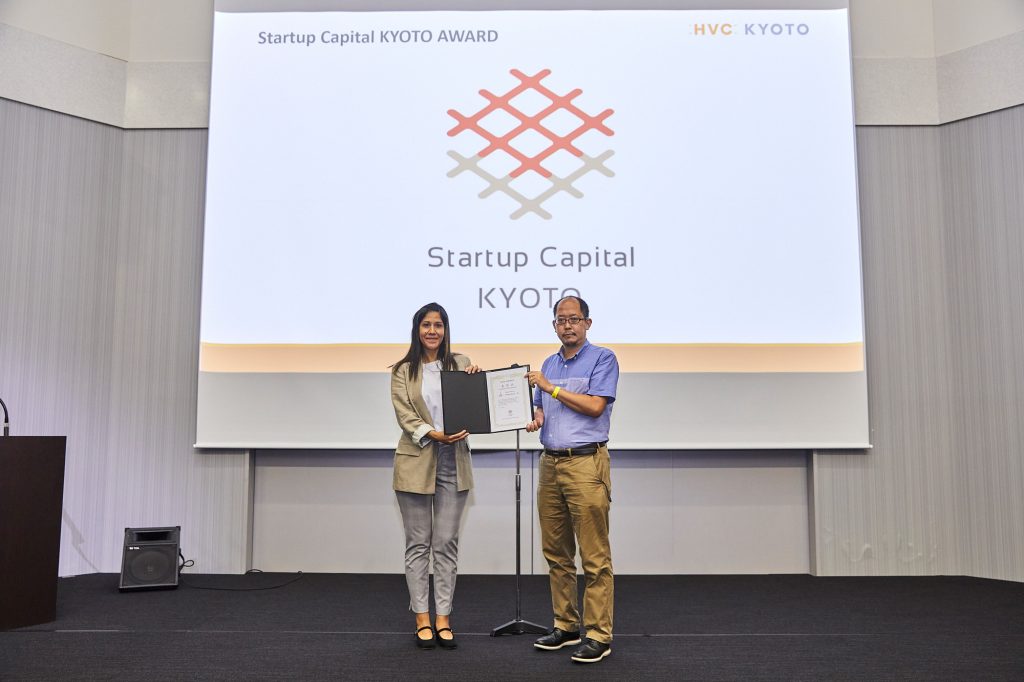Artificially made human tissues and organs is no just a science fiction. We interviewed the company creating the lab-made human tissues of any kind with a goal of subsequent creation of whole organs employing the so called bioprinting technology. Smart Tissues about starting their business in Kyoto.

- 1.Can you tell us about your company‘s background? Why did you decide to create the lab-grown tissues?
I am from Venezuela and I came to Japan around 7 years ago to do my PhD in the Tokyo University. This is where I met with people that now are the Smart Tissues co-founders. After my PhD I moved to Kyoto because I found a job in the pharmaceutical company on the drug development where I worked for almost 3 years. During my work there I realized that there is a huge need in developing new technologies like bioprinting for the preclinical testing of the drugs. There is a gap in the preclinical and clinical tests in the pharmaceutical industry.
Most of the new drugs may fail during clinical trials, although preclinical tests were passed. Usually culturing the cells in the petri dishes and also testing using animals are used, but these systems do not clearly represent the human biology. So we believe that by using bioprinting we may be able to create the 3D human tissues that may help to test the drugs more accurately. Together with other co-founders we realized the need in bioprinting field for the new materials that can support cell growth, such a chitosan – biopolymer that I worked with during my master degree and that our main technology relies on right now. We then created the Smart Tissues and worked on production of unique bioinks that can be used in bioprinting. I later went to work in the CiRA, because of great possibilities to use iPS cells in the bioprinting technology.
The biomaterial for bioprinting acts as a support in which cells can grow and multiply. The chitosan as a biomaterial has many features and advantages for example it has antibacterial properties, it is polycationic and main structure of it is very similar to some tissues in human body. For the use in bioprinting it must have some specific characteristics to comply with mechanical and biological properties, so we conducted many experiments to improve its qualities. Because I had experience with this material we started working with it in particular. Moreover, chitosan was already used in clinical setting for other applications, so that’s also a step forward for the approval of material.
- 2.What do you think are the values of bioprinting?
When I did may PhD I was working with 3D cultures and at that time we were using scaffold in which we incorporated the cells, but in this case most of the cells remained on the surface of it and they did not migrate inside. On the other hand, bioprinting enable us to combine the biomaterial itself with the cells in the form of bioinks, so we can print tissue layer by layer according to the digital model. The bioprinting is therefore may offer a great flexibility, since we can actually accommodate the cells in the 3-dimensional space allowing us to build more complex and realistic human tissues. We believe that such tissues can then be used for pre-clinical testing of drugs, regenerative medicine and even lead to development of lab-grown organs for transplantation.
- 3.Why did you decide to open your business in Japan? Why Kyoto?
We first started in Chile because we found opportunity there with Startup Chile program, but because of advantages Japan gives us we decided to start Smart Tissues in Kyoto as well. We are working in the field of regenerative medicine and Japan is well known leader in this field. There is a big interest from pharmaceutical companies to develop regenerative medicine treatments and also many scientist are working in this field, so we believe Japan is a right country to promote this kind of technologies. For now we are using bioprinting for testing the drugs, but we believe that the time will come when we can advance the technology and create tissues for direct patients treatment and there is a big interest in such new technologies in Japan.
The other reason is that we believe that iPS cell technology combined with bioprinting may be very powerful tool for building human tissues and Japan is well known for iPS cell research, especially Kyoto University’s CiRA.
As the number of events for enterprenuers is increasing the community for enterprenuers is also expanding in recent years in Kyoto. The availability and affordable price of co-working spaces here are also a great advantage. Of course we also maintain operations in Chile and hope to expand in both Latine America and Japan. Bioprinting technology is expanding all over the world creating a great opportunity for us.

- 4.What were the difficulties you had when opening a company in Japan as a foreign enterprenuers? How did you overcome them?
Enterprenuership is hard everywhere. I think one if the main limitations on the beginning was finding good network of enterprenuers to dive in the environment. When you are starting a company you need a lot of mentorship and support from other enterprenuers. It was something difficult to find in Japan three years ago when we started the company. But I feel like it is changing nowadays. Other obstacle is gaining the trust from investors, potential customers and partners. I am not sure if is only for foreigners, but when you do not have a back-up like a huge corporation it is hard to establish this trust.
I also heard that many foreigners struggled to obtain visa to open the business, but in Smart Tissues we are lucky because we are scientists, so we can get the highly-skilled foreign professionals visa and I actually got permanent residence recently, so I do not have to face visa issues.
One of the current the obstacles for us is delivering the bioinks that are produced in Chile to Japan. Chitosan is natural material, so we need to be careful with packaging and delivery to ensure high quality properties with high reproducibility. Because of the time difference, we have the meetings with a worker in Chile at night. We want to establish laboratory in Japan to make the delivery easier and ensure the high quality of the materials. We talked to Kyoto research park (KRP) since they have some share laboratory facility, but we hope to open our own facility soon too.
Nowadays our network grew and we joining some events for enterprenuers. I think this kind of events help to grow the community and attract enterprenuers to Japan. I think once you are here it could be even cheaper to start business than starting company in USA. For example laboratories, common facilities could be cheaper here. Plus great human resources. A lot of talented people especially in the field of regenerative medicine are working in Japan. This is an advantage being in Japan.
- 5.Recently you won the Startup Capital Kyoto Award. How do you feel about receiving this award?
We were honored to receive the price. Especially since there were a lot of other very good start-up companies, we were very grateful to be chosen for the award. And not only for the award, but for the following up support we received later. We were really grateful for that. We had some meeting introductions to the Kyoto City Office and JETRO Kyoto to get support in opening the company and also introduced to other institutions. We are in constant contact with them and continue to grow our network.


- 6.Lastly, what is your future vision of the company?
Now we are in contact with different universities where scientists use our bioinks and give us a feedback. As more laboratories get this material we can discover more properties specifically for some tissues. We cannot test our bioinks by ourselves in all types of tissues, so it is a good approach to get feedback from scientists working in specific field. We can then discover the market need and where to go further. Because it is a new field, there are no many experts in the field, so we will also provide support in terms of full services required for bioprinting. Definitely we want to go in contact with companies too, especially with pharmaceutical companies.
I think we will also grow globally. We are looking for the investments now to open the laboratory in Kyoto and we are ready to go to the market with our unique biomaterial. We also want to grow business outside of Kyoto and establish first bioprinting center in Japan. There is no such facility in Japan yet, so by doing so we can support more scientists that want to work in this area.
We think this technology will expand. This market is growing every year. So we want to be a part of that. One of main goals is to provide support and materials to take bioprinting to the clinical settings. We want to develop tissues that can help many patients. It is our future goal and vision. Bioprinting require support from the private sector, investors and public to realize the importance of this goal. I think bioprinting is very promising and can help many patients in need. Especially if we can construct functional tissues and whole organs in the future.




